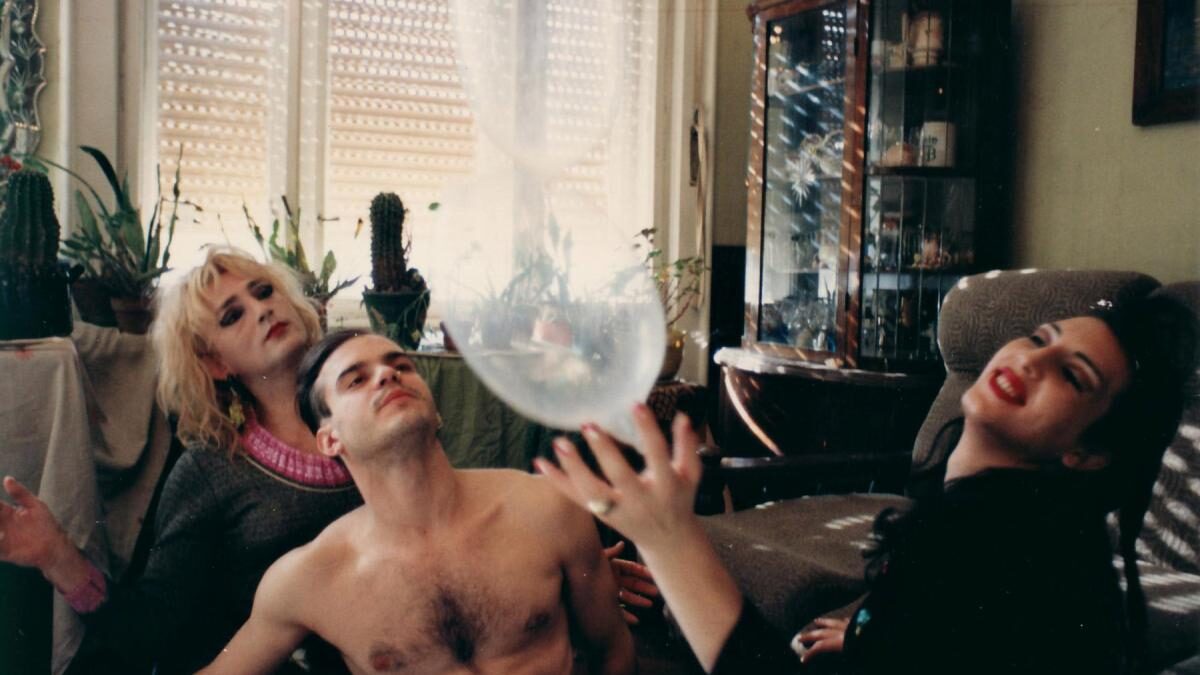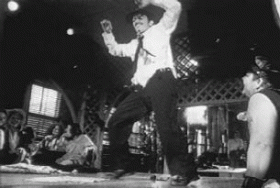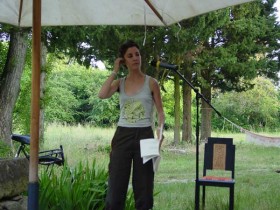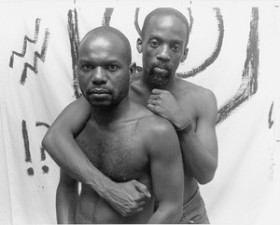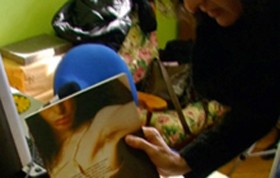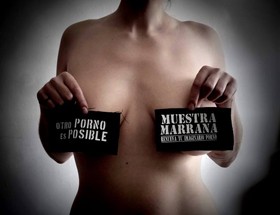Marble Ass
Merlyn has been pacifying the Balkans, turning tricks with countless Serbian guys. Merlyn is a lighting rod sheltering Belgrade, calming violent nighthawks, swanky big spenders, miserable loners and horny young studs, taking on the charge that would otherwise befall little girls, unprotected mothers and helpless old women. Combined with guns, this unbridled energy would eventually lead to bloodshed. Merlyn cools the boiling blood of violent Dinarides and enriches it with love. Johnny comes home to Belgrade, from the war. His motives are apparently similar, he also wants to cool the boiling blood, but he does it by letting it through the holes in the human body, which he makes with bullets or knives. This film is a treatise on the different methods of resolving conflicts, resorted to by Merlyn and Johnny.
FR Yugoslavia, 1995, 87 min, Beta video – transfer to 35 mm, color
written and directed by: Želimir Žilnik
camera: Miodrag Milošević
edited by: Vladimir Milenković
music: Love Hunters, Zbogom Brus Li, Dejan Kijevčanin
cast: Vjeran Miladinović, Nenad Milenković, Nenad Racković, Lidija Stevanović, Miljan Vojnović, Suzana Zlatanović (Luna Lu), Miodrag Suša, Gordan Žabaljac
production: B92, Beograd
Želimir Žilnik (1942, Yugoslavia) has written and directed numerous feature and documentary films which have reaped many awards at domestic and international film festivals. Žilnik is renowned as an initiator of the “docudrama” genre. From the very beginning his films have focussed on contemporary issues, featuring social, political and economic assessments of everyday life, starting with: A Newsreel on Village Youth in Winter (1967), Little Pioneers (1968), The Unemployed (1968) and June Turmoil (1969), Black Film (1971) and Uprising in Jazak (1973), among others.
The student demonstrations of 1968 and the turmoil that followed the occupation of Czechoslovakia are at the centre of Žilnik’s first feature film Early Works (1969) which was awarded the “Golden Bear” at the Berlin Film Festival and four prizes in Pula that same year.
After facing problems with censorship in Yugoslavia while working on his next feature film Freedom or Cartoons (filmed in 1972, never finished), Žilnik spent the mid-seventies in Germany, where he independently produced and made seven documentaries and one feature film, Paradise (1976). These films were amongst the first ever to concern themselves with the foreign workforce in Germany, and they continue to be shown to this day at various retrospectives and symposiums.
Following his return to Yugoslavia at the end of the seventies, he directed a substantial series of television films and docudramas for TV Belgrade and TV Novi Sad (which include The Illness and Recovery of Buda Brakus (1980), Vera and Erzika (1981), Dragoljub and Bogdan: Electricity (1982), The First Trimester of Pavle Hromis (1983), Stanimir Descending (1984), Good Morning, Belgrade (1985), Hot Paychecks (1987), Brooklyn – Gusinje (1988), Oldtimer (1989), Black and White (1990) and other). These films received many awards at television festivals, both at home and abroad.
By the end of the eighties Žilnik was making films through a cooperative structure of television and cinema production. All these works foreshadowed the growing tensions and looming political and social changes that were to affect the country: The Second Generation (1984), Pretty Women Walking through the City (1986) and The Way Steel Was Tempered (1988).
Turning to independent film and media production in the nineties, he went on to make a series of feature and documentary films centring around the cataclysmic events befalling the Balkans (Tito among the Serbs for the Second Time (1994), Marble Ass (1995), Throwing off the Yolks of Bondage (1996), Wanderlust (1998) and other). These films won top awards at domestic festivals (in Herceg Novi, Palić, Novi Sad and Sopot) and were screened at numerous international festivals. In 2005 Marble Ass won the prestigious “Teddy Award” at the Berlinale.
The breakdown of the system of values in post-transitional Central and Eastern European countries and the problems facing refugees and immigrants within the new circumstances of an extended Europe became the focus of Žilnik’s most recent films Fortress Europe (2000; “Victor Award” for Best Film of the Year, Ljubljana), Kenedi Goes Back Home (2003; “Zlatna Mimoza Award” in Herceg Novi), Kenedi, Lost and Found (2005), europe-next-door (2005; Award for Best Regional Film at the Festival of Belgrade 2006 and ZagrebDox 2007), Soap in Danube Opera (2006), Kenedi is Getting Married (2007).
These films have been screened at over 250 international festivals.
Alongside his ceaseless filmmaking and production work, Žilnik has also been active in educational activities. Since 1997 he has been a mentor, teacher and executive producer in many international workshops for students from all over South Eastern Europe (in workshops such as: Divided God in 2007/2008, Petrovaradin Tribe 2005, Crossing Borders in Krsko in the summers of 2003 – 2008, Vite Impossibili in Naples 2003, Document + Fiction in Skopje 1997 and Zagreb 1998). He has been a visiting speaker at foreign film schools (he gave lectures at Goldsmiths College of University of London, University of Leiden, Kunst-Akademie in Vienna, Stanford University, Central European University in Budapest, School of Arts and Communication at the University of Malmö, University College in London, etc.).
